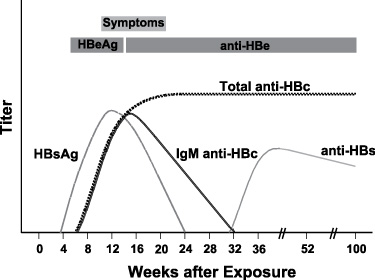HBc IgM (Anti-Hepatitis B core IgM)
Useful For
Detection of IgM-class antibodies to Hepatitis B core antigen as a measure of acute infection.
Indications for Testing
Detection of IgM anti-HBc indicates recent, acute infection of less than 6 month’s duration
Clinical Information
IgM antibody to HBc (IgM anti-HBc) rise rapidly in patients with acute infection and persists for several weeks to months. Hepatitis B surface antigen (HBsAg) will generally also be present as a serological marker of an acute infection, but there are reports of HBsAg being undetectable. The detection of IgM anti-HBc indicates recent, acute infection of less than 6 month’s duration. During this stage of disease, the patient’s liver enzymes may be elevated. The the convalescent phase, anti-HBc IgM will persist after the disappearance of HBsAg and decreases slowly over time. A NON-REACTIVE IgM anti-HBc excludes a recent, acute infection, but it does not rule out chronic infection. IgM anti-HBc in chronic carriers can occur briefly inpatients that move from an inactive carrier phase to an active HBV replication. In this phase HBV DNA levels may increase transiently and then decline due to suppression of viral replication. Anti-HBc IgM can aid to distinguish acute hepatitis illness due to HBV versus superimposed infections by other possible agents such as hepatitis A, hepatitis C, or delta virus. Hepatitis B vaccination does not induce production of anti-HBc antibodies.
Typical sequence of serologic markers in patients with acute HBV infection with resolution of symptoms (Horvat, R. T., and Tegtmeier, G. E. 2007).
Typical sequence of serologic markers in patients with HBV infection that progresses to chronicity. In patients with chronic HBV infection, both HBsAg and IgG anti-HBc remain persistently detectable, generally for life. HBeAg is variably present in these patients (Horvat, R. T., and Tegtmeier, G. E. 2007).
Chronic HBV infection is found in 0.5 % of adults in North America. After acute HBV infection, the risk of developing chronic infection varies with age; infants infected at birth have a 90% chance of becoming a chronic carrier. A chronic carrier is one who retains HBsAg positivity six months after the initial infection. These individuals are always infectious. Hepatocellular carcinoma and hepatic cirrhosis is likely to result in the premature death of 15-25% of those who have chronic HBV.
Reference Values
NON-REACTIVE
Interpretation
For diagnostic purposes, and to stage the disease, results should be used in conjunction with patient history and other hepatitis markers for diagnosis of acute or chronic infection (see special instructions).
REACTIVE: Detection of HBc IgM indicates recent, acute infection of less than 6 month’s duration. It may be detectable in chronic carriers when moving from inactive to active HBV replication
NON-REACTIVE: Excludes a recent, acute infection but does not rule out chronic infection.
See Special Instructions for PHL recommended diagnostic approach to hepatitis.
Clinical Reference
Curry, M. P., and Chopra, S. 2010. Acute Viral Hepatitis, p. 1577-1592. In Mandell, D., Bennett, J. E., and Dolin, R. Principles and practice of infectious diseases, 7th ed., vol. 2. Churchill Livingstone, Elsevier, Philadelphia, PA.
Horvat, R. T., and Tegtmeier, G. E. 2007. Hepatitis B and D Viruses, p. 1641-1659. In Murray, P. R., Baron, E. J., Jorgensen, J. H., Landry, M. L., and Pfaller, M. A. Manual of Clinical Microbiology, 9th ed., vol. 2. ASM Press, American Society for Microbiology, Washington, DC.
James Koziel, M., and Thio, C. L. 2010. Hepatitis B Virus and Hepatitis Delta Virus, p. 2059-2086. In Mandell, D., Bennett, J. E., and Dolin, R. Principles and practice of infectious diseases, 7th ed., vol. 2. Churchill Livingstone, Elsevier, Philadelphia, PA.
Abbott. 2003. Architect System Anti-HBc IgM: package insert. Abbott, Diagnostics Division. Wiesbaden, Germany.

